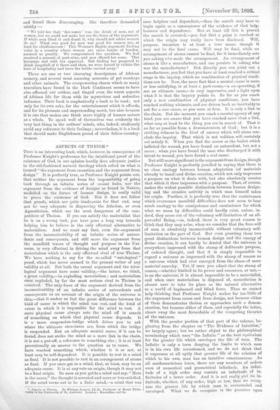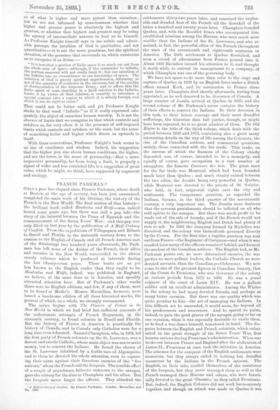ASPECTS OF THEISM.* THIS is an interesting book, which, however,
in consequence of Professor Knight's preference for the intuitional proof of the existence of God, in our opinion hardly does adequate justice to the old-fashioned natural theology which relied on what is termed "the argument from causation and the argument from design." It is perfectly true, as Professor Knight points out, that neither the argument from the impossibility of going back through an infinite series of causal links, nor the argument from the evidence of designs as found in Nature, modelled on the forms of human design, is really valid to prove the existence of God. But it does not follow that proofs, which are quite inadequate for that end, may not be very adequate in disproving the Atheism, or even Agnosticism, which are the most dangerous of the com- petitors of Theism. If you can satisfy the materialist that he is on a wrong tack, you have gone a long way towards helping him to believe in the only effectual alternative to materialism. And we must say that, even the .argument from the inconceivability of an infinite series of antece- dents and consequents, and still more the argument from the manifold traces of thought and purpose in the Uni- verse, is very effectual in driving the mind away from that thaterialism which is the only effectual rival of true Theism. We have nothing to say for the so-called " ontological " proof, which has never seemed to the present writer of any validity at all. But both the causal argument and the teleo- logical argument have some validity,—the latter, we think, a great validity,—in exploding materialism ; and materialism once exploded, by far the most serious rival to Theism is removed. The only force of the argument derived from the inconceivability of an infinite series of antecedents and consequents as an account of the origin of the universe is this,—that it makes us feel the great difference between the kirid of cause in which the mind can rest, and the kind of cause in which it is impossible for the mind to rest. A mere physical cause always sets the mind off in search of something on which that physical cause depends. It is a mere suspension-bridge which drives you to ask where the ultimate structures are, from which the bridge is suspended. But an adequate mental cause, if it can be found, does not strike the mind as a mere link in the chain, it'is not a put-off, a reference to something else ; it is at least provisionally an answer to the question as to cause. We have reached something which, whether it is or not, at least may be self-dependent. It is possible to rest in a mind as final. It is not possible to rest in an arrangement of atoms as final. If you once get to a mind, that, at least, may be an adequate cause. It is at any rate an origin, though it may not be a final origin. So soon as you get to a mind and say," Here is the cause," the thought is arrested and more or less satisfied. If the mind turns out to be a finite mind,—a mind that was
•
Aspects of Thoinn, By William Knight, LL.D., Professor of Moral Philo- sophy in the University of St. Andrews. London : Maemillau and 0o. once helpless and dependent,—then the search may have to begin again as a consequence of the evidence of that help- lessness and dependence. But at least till this is proved the search is arrested,—yon feel that a point is reached at which the origin may really have been disclosed. Will, purpose, intention is at least a true cause, though it may not be the final cause. Will may be final, while an arrangement of atoms cannot be final, for it immediately sets you asking who made the arrangement. An arrangement of atoms is like a manufacture, and one persists in asking who was the manufacturer ? But directly you can point out a manufacturer, you feel that you have at least reached a critical stage in the inquiry, which no combination of physical condi- tions can be. Now, the mere fact that a mental cause is more or less satisfying, is at least a part-cause,—a co-operating, if not an ultimate cause,--is very impressive, and a light upon what it is that the inquiry points to. So far 'as you reach only a new combination of physical conditions, you have reached nothing ultimate, and are driven back as inevitably to ask for a new cause, as you were at first. It is only a link in the chain. But the moment you reach a mental agency of any kind, you are aware that you have reached more than a link, what may at least be the thing you are in search of. That is as far as possible from a demonstration of God ; but it is a striking witness to the kind of answer which will alone con- clude the inquiry. That which is not volition will certainly not satisfy it. When you find the arrow or the bullet which inflicted the wound, you have found an antecedent, but not a cause ; when you have found the man who discharged it with intent to wound, you have found a real cause.
But still more significant is the argument from design, though Professor Knight is perfectly justified in saying that there is no close analogy between human adaptation (of materials already to hand) and divine creation, which not only impresses a purpose on what it deals with, but also absolutely creates that which it thus impresses with a purpose. That, of course, makes the widest possible distinction between human design- ing and the creative activity in which man himself takes his origin. Further, it is perfectly true that the contrivance which overcomes manifold difficulties does not seem to bear much analogy to the omnipotence and omniscience for which what we mean by difficulties could hardly exist, unless, in- deed, they arose out of the voluntary self-limitation of an all- powerful Being,—as, indeed, there is very great reason to think that they may arise, when we consider that the free-will of man is absolutely inconceivable without voluntary self- limitation on the part of God. But even granting these two great distinctions between human design and the energy of divine creation, it can hardly be denied that the universe is everywhere impressed with the stamp of deliberate purpose, of ordered thought, and that it is simply impossible to regard a universe so impressed with the stamp of reason as a universe which had ever emerged from the chaos of mere material anarchy. Yet, if once you admit that the stamp of reason,—whether limited in its power and resources, or not,— is on the universe, it is almost impossible to be a materialist, and when once materialism is disposed of, monotheism is almost sure to take ifs place as the natural alternative to a world of haphazard and blind force. Thus we cannot help thinking that Professor Knight makes far too little of the argument from cause and from design, not because either of them demonstrates theism or approaches such a demon- stration, but because either of them, and especially the latter, clears away the most formidable of the competing theories of the universe.
With the greater portion of that part of the volume, be- ginning from the chapter on " The Evidence of Intuition," we largely agree ; but we rather object to the philosophical terminology which uses "the Infinite " as the best equivalent for the greater life which envelopes the life of man. The Infinite is only a term denying the limits to which man is in his own life accustomed, and we do not think that it expresses at all aptly that greater life of the relation of which to his own, man has an intuitive consciousness. As all mathematicians know, there are any numbers of orders even of numerical and geometrical infinitude. An infini- tude of a high order may contain an infinitude of in- finitudes of a lower order. And it is not really qua its in- finitude, whether, of any order, high or low, that we recog- nise the greater, life by which man is surrounded and enveloped. What we do recognise is the pressure upon
us of what is higher and more potent than ourselves ; but we are not informed by consciousness whether that higher and greater power is absolutely the highest and greatest, or whether that highest and greatest may be using the agency of intermediate natures to lead us to himself. As Professor Knight himself says in one subtle and admir- able passage, the intuition of God is qualitative, and not quantitative ;—it is not the mere greatness, but the spiritual elevation, of the presence that surrounds us, which constrains us to recognise it as divine :-
" It is true that a portion of finite space is so much cut out from the whole area of space—although, if the remainder bo infinite, the portion removed will not really limit it ; but our intuition of the Infinite has no resemblance to our knowledge of space. The intuition of God is purely spiritual apprehension, informing us not of the quantity of existence in the universe, but of the quality or characteristics of the Supreme Being ; and to affirm that the finite spirit of man, standing in a fixed relation to the Infinite, limits it by virtue of that relation, is covertly to introduce a spacial concept into a region to which it is utterly foreign, and which it has no right to enter."
That could not be better said, and yet Professor Knight sticks to that word " Infinite " as if it really expressed ade- quately, the object of conscious human worship. It is not the absence of limits that we recognise in that which controls and subdues us, for very often it is the presence of self-imposed limits which controls and subdues us the most, but the sense of something holier and higher which draws us upwards to
itself.
With these reservations, Professor Knight's book seems to
us one of excellence and wisdom. Indeed, his suggestion that the higher you rise above human conditions, the higher, and not the lower, is the sense of personality,—that a more impressive personality, far from being a limit, is properly a signal of wider and less restricted life, is a suggestion of great
value, which he might, we think, have supported by argument and analogy.







































 Previous page
Previous page